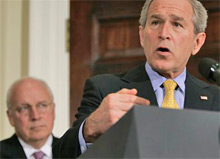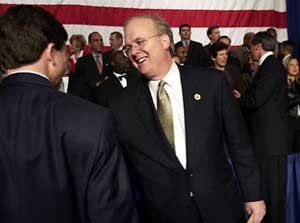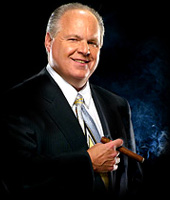The following long piece is purely political. If you want to pass on politics today, don’t read it, but if you want to see how one commentator interprets the mid-term election as a victory for true progressivism rather than centrism, then enjoy yourself. Don’t be put off by the term, “biconceptual”! O, and by the way—Happy New Year!
[SNIP]
Building On the Progressive Victory
By George Lakoff t r u t h o u t | Guest Contributor Friday 15 December 2006
As the 110th Congress prepares to take office, the post-election tug of war for the soul of the Democratic Party continues, with Democratic Leadership Council folks spinning the election as a victory for centrism and others pointing to the role of economic populism.
The tug of war began on November 7, as Rahm Emanuel sprang to the podium in front of national TV cameras to announce a victory for centrism. Two days later, fellow centrist James Carville called, unsuccessfully, for the resignation of Howard Dean from the Democratic National Committee. Dean's 50-state strategy had been crucial in the Democratic victory. Carville and Emanuel are veterans of Bill Clinton's administration. They appear to want a centrist Congress and a centrist DNC in preparation for Hillary Clinton's presidential run.
 The struggle to explain the election continues because it may well affect how Congressional Democrats will decide to act. Economic populism or centrism? The truth, I think, is both more complex and more interesting and brings progressive values to center stage.
The struggle to explain the election continues because it may well affect how Congressional Democrats will decide to act. Economic populism or centrism? The truth, I think, is both more complex and more interesting and brings progressive values to center stage.Framing has been part of the controversy. Framing has been about the deepest progressive values, ideas and principles; future progressive policies, and the enterprise of accurately framing reality. Centrists, because of their concern with moving the party to the right, away from progressive values, have falsely framed framing itself as being mere messaging and spin.
It is time to return to accurate framing, beginning with the election itself.
The Friday night after the election, my wife and I were standing in a movie line waiting to buy tickets. A young man walked by, dressed for a date and carrying a bouquet of white roses. He stopped short, looked at me for a few seconds, pulled out one white rose and handed it to me, saying, "Thank you for helping the Democrats win the election," and walked on.
I appreciated the white rose.
But there really should be thousands of white roses handed out to the campaign workers. And a dozen for each candidate. The reason is that the new members of Congress did better than their predecessors at communicating their values to the public. Not much has been said about it, but they successfully reframed public debate and did so in the best way: they framed reality accurately.
They stopped shooting themselves in the foot, stopped accepting conservative frames, stopped listing facts and figures, and instead connected with their constituents, talked about values, said powerfully what they believed, and named what was real. That was what needed to be done on the communications front. They did it and should get credit for it. We at Rockridge Institute appreciate your achievement, and the media and all progressives should appreciate it too. The Republicans did plenty to defeat themselves, but the Democrats had to work to win it.
Framing matters, as centrists who are trying to frame the election as a centrist win know well. Framing raises the issue of moral worldviews and overall values and principles, and they in turn raise the question of what values lie behind policy prescriptions.
Centrists, who advocate moving to the right, don't want the spotlight on moral values, because moving to the right means adopting conservative moral values. Accordingly, centrists have been trying to downplay framing as if it were merely messaging - words without substance.
Centrism or economic populism? Or neither? The future of our nation may depend on what the Democrats do. And that depends, in significant part, on why they think they won.
There was a marvelous moment on NPR right after the election: Melissa Block asking newly elected representative Heath Schuler of North Carolina, a former NFL quarterback, what it meant for him to be a Democrat, given that he opposed abortion, opposed gay marriage, and supported gun ownership. "Well, it's a reflection of my district," Schuler replied.
"What makes you a Democrat?" Block asked. Schuler replied that it was what his parents and grandparents taught him: "A Democrat helps people that cannot help themselves." What about fiscal responsibility? Earmarks like bridges to nowhere are irresponsible, Schuler replied; instead we should be spending money on education, Social Security, universal health care, preserving the environment, and renewable energy.
In short, what Schuler really cares about, what he was running on, and what he got elected on were progressive policies, even though he happened to hold some conservative positions that inoculated him in his district against charges of being "too liberal."
Schuler is what I've been referring to as a "biconceptual"—someone who has progressive positions in certain areas of life and conservative positions in others. What makes Schuler a Democrat is that he identifies himself politically with the progressive values he ran on, despite having conservative positions he didn't run on.
Bob Casey happens to be a Catholic who opposes abortion rights, but every position he ran on was a progressive position. Jon Tester believes in gun ownership in Montana, but that is not what he ran on. He ran on his progressive beliefs by the dozen. These candidates ran primarily on their progressive positions. Despite having some conservative positions, they did not run primarily on their conservative positions. It was the progressive values they ran on that have given them their mandate.
And Sherrod Brown in Ohio, a state that went to Bush in 2000 and 2004, beat a "moderate" incumbent by 11 percentage points as a clear and powerful progressive voice.
Meanwhile, Harold Ford Jr. lost in Tennessee for many reasons, including a racist ad campaign against him. But among the reasons was the way he campaigned. He ran enthusiastically, using conservative code words: personal responsibility, strong moral values, character education, pro-family, a constitutional amendment defining marriage as a union between a man and a woman, eliminate abortions, and so on. In short, he had Heath Schuler's positions, but unlike Schuler, he ran overtly on those positions and made a big deal of it, trying to convince good ole boy Tennesseans that he was one of them. As Schuler understood, if you really have those positions and really are part of your community in that way, you don't have to say so. As Tennesseans pointed out in interviews I saw, Ford didn't seem credible running as a good ole boy. Moreover, in the campaign footage I saw, his body language betrayed him; he didn't come across as authentic, and authenticity is the name of the game. What he was running on did not, in toto, fit any consistent moral worldview. He was trying to be too many things to too many people.
In short, the Democratic candidate who campaigned on conservative values lost; those who may have had such values, but campaigned on their progressive values, won.
Like Schuler and Casey, swing voters are biconceptuals, with both conservative and progressive worldviews in different areas of life, and with both available for politics. How did these biconceptual candidates appeal to biconceptual swing voters? By taking progressive positions, and campaigning vigorously on them. How did this work? They activated the progressive values in the brains of swing voters.
Why did it work? Because swing voters, being biconceptual, already had many progressive views. A large proportion of those identifying themselves with the word "independent" or even "conservative" happen to have progressive views in many issue areas: They love the land as much as any environmentalist, even though they wouldn't use words like "biodiversity"; many are progressive Christians who take Christianity to be about helping the poor and serving the needy; many are civil-libertarians, though they would never join the "too liberal" ACLU, and most care about their families and empathize with people in dire straits. In short, these are self-identified "conservatives" and "independents" who have very real progressive values in important areas of life.
What is a progressive worldview? It's simple: You have empathy for others, and you act responsibly on that empathy, being both responsible for yourself and socially responsible as well. Progressives say, "We're all in this together," while conservatives say," You're on your own." It was running on those progressive values that won the election for the Democrats.
The idea of "biconceptualism" being conservative in some areas of life and progressive in others is crucial to understanding this election. There is no such thing as a consistent, overarching worldview that is "moderate" or "centrist"—a worldview that generalizes over all issue areas. So-called "moderates" or "centrists" are actually biconceptuals in different ways. Jon Tester's biconceptualism is very different from Joe Lieberman's. They are both called "moderates," but there is no single coherent doctrine that they share. Jim Webb, Rahm Emanuel, John McCain, Lincoln Chafee, Mike DeWine, and Olympia Snowe have all been called "moderates," but again there is no single set of principles that they all adhere to.
In this election, those candidates who defined themselves by arguing progressive positions activated the progressive worldview in those voters who had both worldviews available. In short, the so-called "moderate" Democrats talked to their "moderate" voters with the same morally grounded progressive arguments they used with their progressive base. They did not talk up all the progressive positions. But they talked up progressive positions they really held, positions that in most cases signal an identity as a Democrat.
What does this say about what the direction of the Democratic Party should be and not be? It says that the Democratic Party should not be moving to the right on the positions its candidates ran on. Success as a party depends, instead, on having a clear moral vision and carrying it out. Right now, it is the progressive moral vision that has brought them electoral success and a mandate for change.
Does this mean that the Democratic Party, as a party, should endorse all progressive positions? That is something for the party to work out, and it will certainly answer no. But, the Democrats may well wind up advocating mostly progressive positions, though far from all of them.
Take the 100-hour agenda. It breaks into two parts, for the two aspects of progressive values: empathy and responsibility. The minimum wage, college loan interest, prescription drug prices, and stem cell research are all empathy issues: they are about caring about working people, young people, old people, and those with debilitating diseases. Lobbying reform, pay-as-you-go budgeting, and enacting the 9-11 Commission's recommendations are all responsibility issues. What the progressives, blue dogs, and centrists can agree on are all instances of progressive values. (Rockridge Nation, the new community that the Rockridge Institute has just launched for progressives to frame the debate at www.rockridgenation.org, will feature a video in January in which I plan to discuss the 100-hour agenda and MoveOn.org's priorities in the context of a broader progressive vision.)
Neuroscientists know that there are two conditions for change in the synapses: repetition and trauma. The campaign provided the repetition through ads and campaign speeches. And three realities created traumas for the American public: Katrina and the floating bodies, Iraq and the bodies blown to bits, and the systematic financial and moral corruption represented by DeLay, Abramoff, and Foley. The new Democratic winners didn't shrink from pointing to those traumas, nor did they soft-pedal their progressive views. They created a narrative of good guys who care and bad guys who don't; good guys who use government to get things done for people and bad guys who are out to destroy government and don't get things done.
In the process, they have started a new progressive populism - not a mere economic populism, but a thoroughgoing progressive populism. It was not just about economic issues. It was also about renewable energy and global warming, about honest government, about a government to count on in case of disaster, about not getting people killed in Iraq day after day, about keeping good jobs here and creating more of them, and about the importance of science in fighting disease. In short, it was about government that cares about its citizens and acts responsibly toward them and toward others in the world. And as with a real populism, there was a handy oppressor: radical conservatives in Washington who were lying to the citizenry, taking bribes, outsourcing jobs, getting our troops killed, letting a beloved city die, and all the while getting rich on no-bid contracts. If that isn't rot at the top, I don't know what is.
The morals of the election are these:
Progressive values-based reframing has begun to work, because it has been paired with authenticity (saying what you believe) and with framing that highlights the very real traumas affecting the nation. The Democrats who won Republican seats did so by running on progressive values. Swing voters, who have both sets of values, responded to their campaigns based on progressive values they authentically believed in. The party, as a party, therefore should not be moving to the right and adopting conservative positions, even if a number of party members happen to hold such positions. To move to the right is to give up any claim to a consistent moral vision at the heart of the party. At the same time, the party, as a party, need not, probably should not, and certainly will not adopt all progressive positions.
The role of the progressive activists, grassroots, and netroots is to promote progressive values to biconceptuals both within and outside the Democratic Party to activate the progressive beliefs they already have, and to extend them further by speaking a progressive language and using progressive values, ideas, and arguments. The goal is not just to move the Democrats in a more progressive direction, but to move Republicans and independents in that direction as well. The idea is to benefit the nation, not just the party.
A populist progressive movement has begun, and it needs to be both studied and nurtured. And conservative values and practices, when they lead to people getting hurt and our democracy undermined, have to be attacked overtly. The villains and their villainy have to be named. What's wrong with conservatism has to be shouted from the housetops. Bob Burnett has made a good start in a paper at: http://www.huffingtonpost.com/bob-burnett/killing-conservatism_b_35771.html
This election marked a progressive victory and a victory for progressive efforts at factually accurate, values-based framing. We at Rockridge celebrate the triumph of progressive ideas and values, as well as framing that accurately portrays reality. We give a special nod to Jim Webb, both for his economic positions and coming out and calling the occupation of Iraq an "occupation." We celebrate those in the media who call the civil war in Iraq what it is.
We at Rockridge are proud of our role in the recent victory for progressive values. We will, from the outside, be cheering on those on the progressive side of the internal Democratic tug-of-war. We hope that all the biconceptual Democrats those who are Democrats because they identify with and run on their progressive values will be pulling with us.
--------
George Lakoff is the author of Moral Politics, Don't Think of an Elephant!, Whose Freedom?, and Thinking Points (with the Rockridge Institute staff). He is Richard and Rhoda Goldman Distinguished Professor of Cognitive Science and Linguistics at the University of California at Berkeley, and a founding senior fellow at the Rockridge Institute.
[PASTE]





























